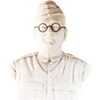ABOUT THE DEPARTMENT
“The construction of the universe is certainly very much easier to explain than is that of the plant”. Georg Christoph Lichtenberg
Department of Botany came in existence in 1948 with I. Sc. Course in Biology. In view of lively rural surroundings and rich diversity in plants, there has been candid demand for opening. Dr. Kamal Krishna Sarkar, M.Sc., D.Sc. took the responsibility of teaching the Botany. Mr. Tarun.K. Bose joined this department and subsequently became the head of the Botany Department. Since 1971 the department of Botany has been enrolled for only general stream of course. From 1994 academic session, the Department was upgraded to honours level of teaching. All the aforesaid courses are under the affiliation of the University of Burdwan. From the academic session 2017-2018, the Department of Botany has introduced the Semester system of evaluation at the under graduate level (CBCS system).
OBJECTIVE
- To Impart quality education in the fields of Botany to make the students acquire an in-depth knowledge relevant to local, regional, nationaland global needs.
- To adequately equip the students to apply themselves meaningfully in any activity requiring botanical expertise.
- To produce well trained careers and inculcate the concept of conservation of biodiversity and to provide a wide-spectrum comprehension of aspects of plants.
INFRASTRUCTURE
Library
In the departmental seminar library, there are large number of current edition books of Botany/Biology/Plant Science. A separate Accession Register is maintained. An additional facility for the Honours students to borrow books.
Total No of Books: 275 books.
[Click Here]
Departmental Laboratory
(1), Biochemistry (1), General lab (2).
Instruments: Well-equipped laboratories with instruments and microscope for students to perform experiments. Common instrument centre with sophisticated instruments like Analytical balance, pH meter, Water bath, Laminar flow, Autoclave, Hot Air oven, Rotary Evaporator, and Microscopes to name the important ones.
Teaching Learning Methodology
Blackboard teaching, ICT enabled classroom teaching, Hands on training during practical classes as per specified syllabi, Field work in nature.
Instruments
Well-equipped laboratories with instruments and microscope for students to perform experiments. Common instrument centre with sophisticated instruments like Analytical balance, pH meter, Water bath, Laminar flow, Autoclave, Hot Air oven, Rotary Evaporator, Microscopes to name the important ones.
Herbarium
The department has established HERBARIUM. The herbarium is a pride of the Department of Botany. An herbarium is a critical resource for biodiversity, ecological, and evolutionary research study. An herbarium consisting of plant specimens belonging to a large no. of Angiosperms is present in the department. Besides Angiosperms, there are Pteridophytes and Gymnosperms specimens as well. Each year the students of Botany actively participate in excursion trips and collect various plant species. Some species are kept in the Herbarium after proper treatment.
The herbarium of the Botany Department serves many purposes:
- It gives an idea of the nature of vegetation in a particular area in a season.
- Examination of herbarium sheets gives an idea of the range of distribution of a species, phylogeny, and also the flowering and fruiting time.
- Herbarium sheets are very good study material for the students to understand the different family characters.
- Herbarium sheets become a ready reference for future collectors and research workers in the field of systematics.
- The herbarium preparation may help to check the identity of newly collected plants may aid in teaching and may be of great value as a historical collection.
Medical Plant Garden
The Medicinal Plants Garden of our college, Netaji Mahavidyalaya was started in the year 2023 with large number of useful medicinal plants. It consists of three parts –
- Some medicinal plants were planted just behind the Department of Botany. It includes Vitex negundo (Nisinda), Dillenia indica (Chalta), Atalantiasp (Kanklas), Phyllanthus emblica (Amlaki), Terminalliabellirica (Bohera), Aegle marmelos (Bael), Costussp (Insulin plant), Piper longum (Pipool), Rauvolfia serpentina (Sarpagandha), and many other plants.
- Some fruit plants are nurtured in front of the Department of Botany namely, Mangifera indica (Aam), Syzigiumcumini (Jam), Syzigiumsamarangense (Jamrul), Psidium guajava (Payera), Citrus cavaleriei (Gandharaj Lebu) etc.
- Mango orchard having large number of mango plants and some other fruit as well as medicinal plants are grown behind the Water Analysis Laboratory as well as Students Union Room of the college.
A large number of timbers yielding plants such as Tectona grandis (Segun) was also planted in the periphery of Medicinal Plants Garden.
Importance of the Garden
- These plants produce fruits and leaves having medicinal and or nutritional values. These fruits are eaten by the birds in nature. It is also used by the students and staffs of the college
- Bark of some plants are used in the preparation of the folk medicine.
- The students of the college acquire knowledge about the active principles of these plants like vitamins, minerals, alkaloids and other plant metabolites during practical classes or field visit with the teachers.
DEPARTMENAT ACTIVITY/LINKS/ACHIEVEMENTS
Departmental Research
The departmental teachers are involved in research and publications in different areas of plant science. One Major Research Project on “Monitoring of pollen incidence in the atmosphere of Hooghly district, West Bengal concerning allergic disorders” in the name of Dr. J. K. Pal as Principal Investigator was approved by the U.G.C. and the project was completed successfully in December 2015.
Two Research scholars have worked their research works under the supervision of Dr. J. K. Pal. Dr. Sayani Biswas has been awarded her Ph. D degree under the joint supervision of Prof. Ambarish Mukherjee, Department of Botany, University of Burdwan and Dr. J. K. Pal, Department of Botany, Netaji Mahavidyalaya in the year 2018. Dr. Biswas is now working as a faculty member in the Department of Botany of the college.
Dr. Pritha Bhattacharya (Sasmal) was awarded her Ph. D degree under the supervision of Dr.J. K. Pal, Department of Botany, Netaji Mahavidyalaya in the year 2018.
Excursion/Field Work
Excursions are arranged to give exposure to students. Field education is equally important as classroom teaching. It adds vigorto learning processes and relieves the monotones of indoor education. The major objective is to familiarize the students with the flora and ecology of the region. Every year students also visit the Central National Herbarium and Acharya Jagdish Chandra Indian Botanic Garden, Howrah. Local excursions also arranged in college campuses and adjoining areas.






























































































